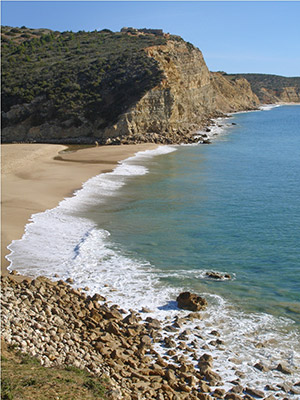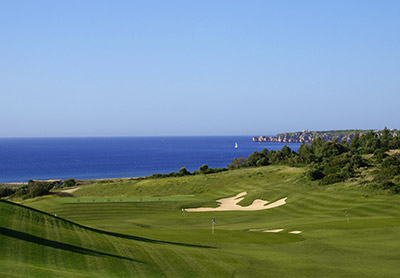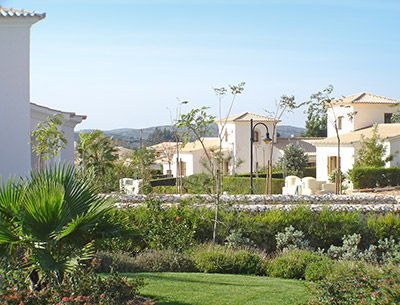Top 10 reasons to relocate to Portugal’s Western Algarve
1. Climate
3,000 hours of sunshine per year, cooling ocean breezes to moderate the summer heat, and seasonal rainfall all contribute to a great climate. No wonder Andalusians have been snapping up holiday homes in the area!

2. Accessibility
Faro is among the best-served warm weather destinations for cheap flights from UK and European cities. The 2h 30m flight time puts it within easy weekend reach. A modern, fast motorway network connects the Western Algarve to Faro, Seville, Lisbon and beyond.
3. Easy Getting Around
Traffic is light, congestion non-existent and parking easy.
4. People and Community
The local Portuguese are friendly, tolerant, welcoming, and most speak English. There is a sizeable expat community drawn from many European countries, with the British and Irish accounting for more than half. Brits have been settling in the Algarve for more than 30 years, and are well established and represented in local business and social structures. There is excellent, inexpensive, English language private education to GCSE level, a thriving Anglican church, plus Lions, Rotarians, an Anglo-Portuguese Chamber of Commerce and other bodies.
5. Environment
The air and water are clean and the countryside unspoilt, with a low population and lots of wide, open space. There is no industry or large-scale agriculture. A strict national planning regime preserves areas of special biological interest and protects from over-development. West of Lagos lies the Costa Vicentina Nature Park, with its 150 km of protected coastline, its dramatic cliff and rock formations, and some of the best beaches anywhere.

6. Sports and Leisure Opportunities
The Algarve has 35 golf courses, including some of Europe’s best. The Western Algarve includes the recently re-designed 27-hole Palmares course, with its links holes and magnificent ocean views, as well as Boavista, Parque da Floresta and the soon-to-be-opened course at Espiche.
As regards water sports, the west is the best for surfing, windsurfing, parasailing, sport fishing, yacht charters and sailing courses, with water-skiing, scuba diving and sport fishing also very well served.
 There are great facilities for tennis, padel, squash, bowls, mountain biking, blo-karting and microlite flying. Many of the cliffs in the Sagres area are now marked out with climbing pitches.
There are great facilities for tennis, padel, squash, bowls, mountain biking, blo-karting and microlite flying. Many of the cliffs in the Sagres area are now marked out with climbing pitches.
The Kartódromo go-kart track at Portimão’s Autódromo is among the world’s premier karting venues, while the Autódromo itself is on the World Superbike Championship circuit.
The Sagres peninsula is a superb location for bird-watching, particularly during the seasonal migrations. Sagres is also at the western end of the Rota Vicentina, a walking trail that winds its way through 300 kilometres of the Algarve’s most beautiful countryside.
Algarve theme parks include Slide ‘n’ Splash, Aqualand, Zoomarine and the Fiesa sand sculpture park. The zoo at Barão S. João is focused on conservation and protection, and is a model of modern practice, with beautiful habitats for its 120 species, as well as a petting zoo for children.
The Department of Tourism sponsors Allgarve, a year-round programme of world-class cultural and sporting events, while the municipal cultural centres host concerts, art exhibitions and other activities.
7. Food and Drink
One of Portugal’s best-kept secrets is its gastronomy. Olives, figs, almonds, pine nuts, grapes and citrus, plus a wide range of seasonal produce including sweet potatoes, are all grown locally. Cheeses, particularly blended soft cheeses, cured hams, and the famous acorn-fed black pork from the Alentejo, are all excellent, as is the olive oil.
At the local fish markets you can find freshly caught Atlantic sea bass, stone bass and golden bream among other varieties, as well as oysters, mussels, clams, and a local delicacy perceves or goose barnacles.
The tradition of wine-making dates from ancient times, with Portugal even exporting to Rome during the Roman occupation. Best known for port, which is produced by a unique vinification method in the unique micro-climate of the Douro valley, Portugal actually possesses a wide array of native varietals and distinct regions, resulting in an abundant variety of excellent wines.
Modern techniques and equipment have transformed Algarve wine production, so that there are now some very good local boutique vineyards, such as Quinta do Barranco Longo in Algoz.
8. Reasonable Cost of Living
While the cheaper pound makes Portugal more expensive for Brits, it is still one of Europe’s lower-cost destinations. Property prices in the Western Algarve compare favourably to Spain and, while petrol and utility prices are relatively high, wages in Portugal are much lower than in Northern Europe. This means that basic living costs such as property ownership taxes, public transport and health are low, with services generally cheaper than in Northern Europe. Locally produced food and drink, beer, wines, spirits and cigarettes are also inexpensive.
It is worth noting that there is a favourable tax regime applicable to foreigners taking up residence in Portugal after 1st January 2010. Portuguese-sourced income from “high value-added activities” is subject to a low tax rate ceiling, while foreign-sourced income is not taxed in Portugal if it has already been taxed under an applicable double-taxation treaty.

9. Stable Political, Economic and Business Environment
Portugal joined the European Union in 1986 and has been part of the eurozone since its inception. As one of the poorer EU nations, Portugal has been the recipient of European structural funds to improve infrastructures. modernise industry and make businesses more competitive. The much lower interest rates under eurozone membership have stimulated home ownership and the economy generally, up until the current eurozone crisis.
Although bureaucracy is still an issue, there has been a gradual shift to easier, more transparent processes, and a marked reduction in tax evasion, corruption and fraud.
10. Good Health Services
The free national health service does a very good job of dealing with acute and emergency conditions, as well as routinely recurring procedures such as vaccinations. Waiting lists for non-emergency surgical procedures are limited to six months, or one year, depending upon the procedure. The cost of prescription medicines is subsidised and tax-deductible. The national health service is complemented by a network of private practices and hospitals, which are relatively Inexpensive. Private health insurance is also reasonably priced. Both dental and vetinary care are of a high standard and very reasonably priced.
The Algarve appeals to:
Hikers, ramblers, bikers, scramblers, musicians, artists, writers, sailors, fishermen, surfers, beach bums, yogis, mystics, sufis, tantrists, naturists, pacifists, peaceniks, beatniks, escapists, hippies, tree-huggers, environmentalists, twitchers, witches, sovereign citizens
The Algarve may not appeal to:
Blingers, mingers, clubbers, city slickers, urban farmers, culturatis, fashion victims, high heel wearers, gangstas, couch monkeys, sofa spuds, mall rats, agoraphobics, tie guys, fundamentalists, hard-liners, neo-cons
14 Responses to “Top 10 reasons to relocate to Portugal’s Western Algarve”
Leave a Reply




Yves droulez on February 18th, 2014
Just want to invest in your contree.I want to buy a propertie and leave in your contry. I want to leave the Belgium government mafia.But I want to deal with advocate and notaries to make sure that my monney will be correctly invested.
John Tranmer on February 19th, 2014
Hi, I will send you an email with a recommendation for a lawyer. Je vous invite d’ecrire en Français si c’est plus facile.
Lanzones44@yahoo.com on April 21st, 2016
Can an American citizen buy a property there or can an American citizen live there for as long as he/ she wants ?
John Tranmer on April 21st, 2016
There are no obstacles to foreign ownership of Portuguese property. It is also possible for American citizens to obtain residency in Portugal. One option is the so-called Golden Visa under which citizens of countries outside the EU can obtain the right to permanent residency based on an investment in Portuguese property or in a Portuguese business. The qualifying level for a property investment is generally €500,000 but is lower for the area in which AlmaVerde is situated. I believe that it is €400,000. Golden Visa residents do not even have to actually be in Portugal for more than an average of 7 days per year in order to be able to continue to have the right to reside. I hope this helps.
Nomayo325 on May 16th, 2016
We are Italian-Americans. We divide our year between a college town in Oregon, Ajijic, (a small village on lake in central Mexico), and Maratea, on the southern coast of Italy. We’ve been thinking about adding the Algarve to the mix. This year we have only one week to explore Portugal so I would like some advice about which Algarve city or town we should visit. We prefer small towns or villages, big enough to have a local butcher, fishmonger, and grocery store, but small enough so that people still look you in the eye and greet one another on the street. No golf or tennis, no gated community isolated from the local population. We do not want to be dependent on an automobile. We would like some contact with an English speaking population. We’d like to get up in the morning and walk to a local coffee shop, have a coffee and pastry, check email, share some time with locals, English and non-English speaking, perhaps go to a library to browse some English books or videos, then head off to the beach for a while. Any suggestions about a home base?
John Tranmer on May 16th, 2016
The town of Lagos would seem to be an ideal Portuguese base for you. It is perhaps a bit larger than your dream location, but the old centre with its small streets of shops cafes and restaurants is largely pedestrianised. There are fish, meat and farmers’ markets, a marina and a number of beaches within walking distance. The largest, Meia Praia, is 5 km long. Most locals speak English plus there is a sizeable expat community, so plenty of opportunities for socialising. The town of Praia da Luz 4 km west of Lagos is also a possibility. It is much smaller than Lagos but also ticks your boxes.
Marie on November 9th, 2016
Where would I find info on renting on or walking distance
to the beach? The cost & safety would be most important. I will be travelling along some times. Thanks, Marie
John Tranmer on November 9th, 2016
You can check villa rental availability and pricing on our main website http://www.almaverde.com. AlmaVerde is 2 km from the nearest beach at Burgau. We rent mountain bikes and provide maps to help guests to explore the area, but to discover more of the area including the west coast you would really need motorised transport. The area is very safe. I hope this helps.
youcouldtravel on December 26th, 2016
Do you know anything about Vilamoura? We are a couple from Bristol, UK who wishes to move to Vilamoura but are not too sure if that is the best location. We want amenities (shops, restaurants and supermarkets), a nice long beach, affordable but modern accommodation, quiet during night time 🙂
Any areas we should avoid? Any areas we won’t feel safe?
Thank you so much
Dave K. on April 6th, 2017
Thank you, John for all of the useful information you have given. My wife and I are looking to retire from the U.S. to the Algarve and are researching all that we can. We prefer a coastal town, and keep coming back to Lagos.
Dfwzetec on July 16th, 2017
My girlfriend and I are interested in retirement in the Algarve .She is Brazilian and I am English.
I currently spend 3-5 months in Brazil with as she is still working, whereas I am retired.
We would like to take a two week holiday to Portugal next Spring to check out locations and affordability of rented accommodation.
If,having visited your country,we then want to go and retire there, would the process difficult,and where would we need to go to get help on this,please.
Kind regards,
David Wellard
John Tranmer on July 17th, 2017
Hi David
The process of establishing residency for retirees with financial resources is not difficult. There are some government schemes set up specifically to attract foreign retirees. One is Golden Visa scheme and the other the Non-Habitual Residency (NHR) tax regime. The Golden Visa gives you the right of residence in return for a property investment of €500,000 (or €400,000 in an area of low population such as Vila do Bispo). But you do not necessarily need to make an investment in order to be accepted as a resident. NHR gives you a 10-year tax holiday on foreign passive income. There are various resources available to help, including local lawyers and tax advisors. I suggest that you check out http://www.algarveseniorliving.com and http://www.afpop.com.
Kind regards
John Tranmer
Lopes da Silva on July 31st, 2017
You should also mention that it is a good idea to learn portuguese and merge with the locals instead of living in your own private brit bubble. I have met brits who have been here more than 20 years and do not speak the language… don’t assume everyone will speak english so you don’t have to learn portuguese. It is rude.
John Tranmer on August 1st, 2017
I agree that foreigners taking up residency here should make an effort to learn Portuguese, but as an expat Brit myself, I can say that my early attempts were generally ignored, as most of the locals that I met spoke much better English than my hesitant and stumbling Portuguese. It is easy to become discouraged. Only now after many years living here is my Portuguese good enough so that this doesn’t always happen. The other factor is age. Older people may be willing to learn but do find it more difficult, especially if they have no previous experience of learning foreign languages.